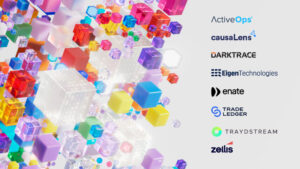
How start-ups are tackling society’s challenges using AI – and how you can join them
What makes AI such a powerful force in tackling society’s challenges?
At this year’s Future Decoded, Lucas Joppa, Microsoft’s Chief Environmental Officer, told attendees ‘the opportunity for a few lines of code to fundamentally change the way that we monitor, model and ultimately manage earth’s natural systems is potentially transformative.’
That transformative power of the technology is critical to overcoming today’s global challenges. From global environmental issues to unprecedented population growth, the world demands tools that match the scope and scale of the problems we face.
This is also a core message from Anne Radl, at the Social Tech Trust, who told Future Decoded Live that social missions drive real technological innovation, but only as long as the conditions are in place for people to come together, share ideas, and collaborate.
Microsoft’s AI for Good programme is all about creating these conditions. In the UK, Microsoft and its partners are creating a hands-on experience for start-ups to get involved with the AI for Good initiative. During her interview, Anne mentioned that ‘any purpose-driven venture with a demonstrable commitment to social impact can apply. You can be a for-profit business, a social enterprise, a charity – as long as you can show us that your pursuit of environmental sustainability, accessibility, humanitarianism, or the protection of cultural heritage, is driving your AI solution.’
The four-month programme, which runs between February and May 2020, aims to inspire and educate leaders of such organisations to use AI to enhance their social impact. Each month, participants receive 10-14 hours of workshops focusing on three core areas: business development, AI, and social impact. By the programme’s end, the cohort will have knowledge and resources to help them implement a responsible AI solution into their operations.
First-hand stories
At Future Decoded, we heard from leaders of several organisations that took part in the first AI for Good programme.
Nick Wooley, CEO of ev.energy, recounted that AI for Good helped his organisation ‘unlock its social mission’, whilst also uncovering the true consumer value of the platform. These insights enabled him to build a robust and scalable service with AI at its core, which empowers drivers of electric cars to charge their vehicles more cheaply, using renewable energy.
Agrimetrics’ Chief Scientific Officer, Richard Tiffin, explained how the programme helped better connect the company with the farmers using its tools. According to Richard, ‘the key thing with farmers and any decision-maker is to hide the technology as far away as possible, in order to give simple, usable messages. For example, we have an application with a red or a green light that indicates when you should or shouldn’t spray their crops. That’s how we deliver information to people who are not from a technical background.’ It’s this simplicity and usability which drives meaningful impact.
Both Agrimetrics and ev.energy formed part of the cohort under the AI for Earth pillar, which consists of organisations addressing global environmental concerns spanning agriculture, biodiversity, climate change, and water.
Dr Isabel Van de Keere, founder of Immersive Rehab, explained that her organisation ‘aims to transform neurorehabilitation with virtual reality to improve mobility for patients with neurological conditions.’
Immersive Rehab now uses machine learning and AI to personalise the rehabilitation experience to each patient. Every patient has a different set of conditions and injuries, so programmes must be tailored to their needs. The system can also track how a patient’s condition is evolving, tracking mobility and response times, adapting treatment accordingly. Dr Isabel added that ‘when these people leave the hospital, they have hardly any mobility, which means that they don’t have any independence to live their life at home. It’s our mission to change that.’
Wouldn’t it be great if travel worked equally as well for people with disabilities as it does for the able-bodied? This is the question that CityMaas is addressing – and it’s harnessing crowd-sourced data, AI, and adaptive filtering technology to do it. The startup, a cohort graduate in the AI for Accessibility category, provides disability-friendly directions and transportation links through their digital mapping tool.
‘CityMaas is my vision for a user-centric mobility solution,’ says CEO Rene Perkins. ‘Through the AI for Good accelerator programme, we’ve benefited from business development and personal branding training. Microsoft and the Social Tech Trust have not held back in terms of making introductions for CityMaaS, inviting us to exhibit in a great number of trade shows and providing PR and media opportunities.’
Get involved
If your organisation has an AI-driven solution and is looking for support in taking it further, there’s still time. We’re currently accepting applications for the AI for Good accelerator programme until 22 November.
Make a societal impact – visit our website for more information and application guidelines.
About the author
 Chester Broad is a new Microsoft Aspire Experience hire who recently graduated from the University of Bath, where he studied Management with Marketing. Now part of the Experiential Marketing team, Chester’s focus is on skills-based and internal events, through which he takes a keen interest in how the Microsoft brand can be communicated as an experience. Prior to this, he spent a year as an intern in the PR team.
Chester Broad is a new Microsoft Aspire Experience hire who recently graduated from the University of Bath, where he studied Management with Marketing. Now part of the Experiential Marketing team, Chester’s focus is on skills-based and internal events, through which he takes a keen interest in how the Microsoft brand can be communicated as an experience. Prior to this, he spent a year as an intern in the PR team.




